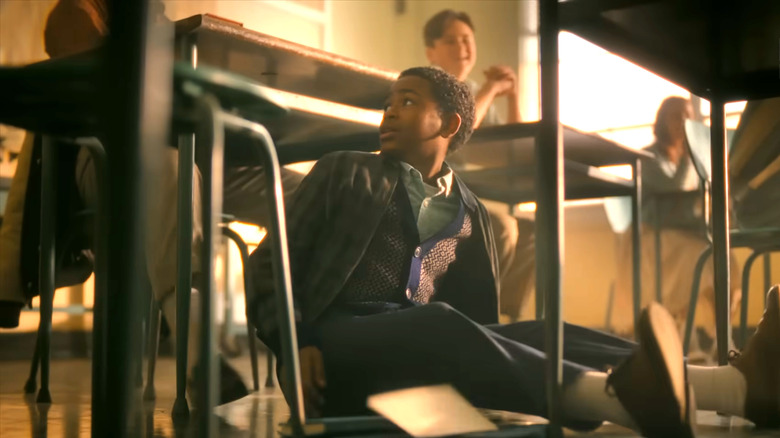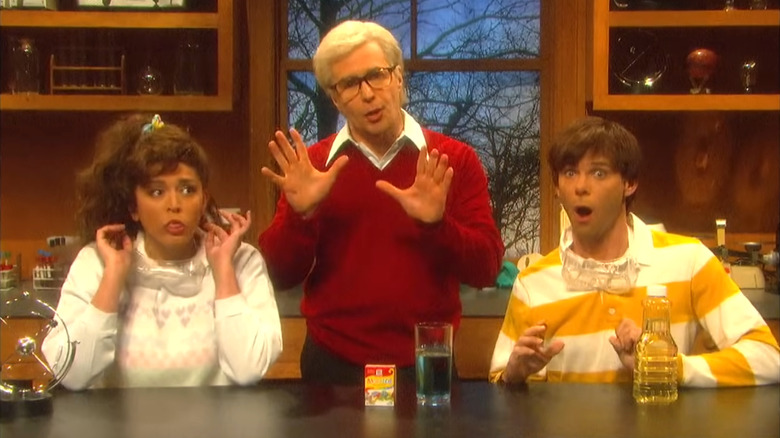Stephen King Gave HBO's It: Welcome To Derry Creators An Invaluable Profanity Lesson
One of the best parts of Stephen King's "It" is the way King fully embraces the 1958 vibes of the kids' timeline. King himself was a child in 1958, so he drew on the actual slang he and his friends used, with a specificity that would be hard to capture if he hadn't been there himself.
King's experience as a '50s kid and '60s teen came in handy for the writers of the upcoming HBO show "It: Welcome to Derry." Showrunners Andy and Barbara Muschietti, both born a generation after King, do not have that intimate knowledge of '50s slang and profanity, so they leaned on the author himself for help with writing the dialogue for these 1962 kid characters.
"In this back and forth that we have, there are a lot of details that you cannot get unless you're talking to someone from that generation," Andy Muschietti said about King in the latest issue of SFX Magazine. He added:
"One of the most special moments that we had in all these developments is Steve writing an email and saying, 'Well, we didn't use the word 'f***' a lot when we were kids. Actually, if you said 'f***' or 'f***ing' in front of someone, you would expect to be knocked down.' So he wrote a whole email about the word 'f***ing' because, of course, there's a lot of cursing in our movies."
The lack of f-words in '50s slang can be seen throughout the book. While modern kids would tell chatterbox Richie to "shut the f*** up," the '58 kids instead tell him, "Beep, beep, Richie." You might think that's the author sanitizing the story, but the rest of the book — which does not shy away from depicting the casual slurs people would drop at the time — makes clear that's not what's going on here.
The F-word sure has evolved over the years
It's easy to see what King means, because even in the past 20 years, you can definitely see the declining taboo nature of the f-bomb. I often overhear kids today say the word, and their parents will barely even pretend to be upset with them. We've reached a point where even milquetoast self-help books will have the swear in the title, and teens will make fun of those titles for trying too hard.
Perhaps the clearest sign of the changing times is the way politicians have used it. Texas Senate candidate Beto O'Rourke called a guy a "motherf***er" at a campaign rally in 2022, and people barely noticed. Some Republicans tried to raise a stink about it, but they weren't successful because, well, look at all the actually vile stuff their leader's been saying. At a certain point, politicians swearing stopped being a memorable thing to voters, even though 20 years ago it would have gotten them into serious trouble. As of 2025, we've reached a point where a politician saying the f-word feels more corny than it does dangerous. Once Chuck Schumer starts throwing around f-bombs, you know the word's lost all bite.
Another indicator comes from the reactions to the word on live TV. When Charles Rocket said "f***in'" in a 1981 episode of "Saturday Night Live," it shocked the nation. He had to go on an apology tour to the NBC execs and was fired a few weeks later. Meanwhile, in a 2018 "SNL" sketch, host Sam Rockwell accidentally blurted out the f-word, and everyone found the slip-up charming. Back in the late '50s of Stephen King's "It," saying "f***" on live TV would have horrified half the audience; today, they'd forget about it by the time the show cut to commercial.

